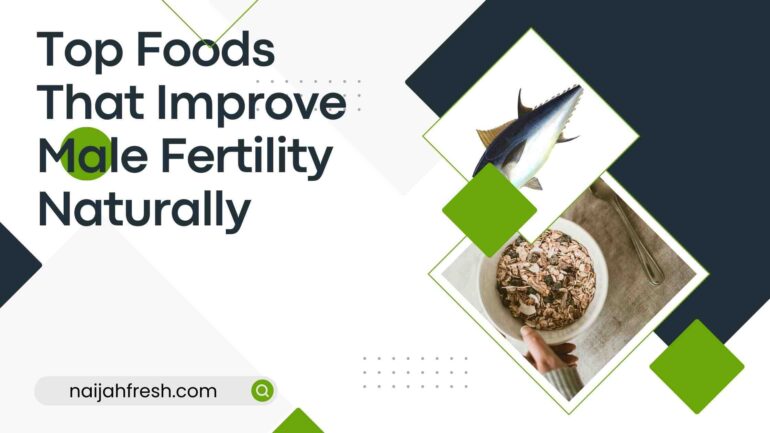Trying to start a family? Or just want to keep your reproductive health in top shape?
What you eat plays a massive role in your fertility—and it’s not just about “eating healthy.” Certain foods have specific nutrients that directly support sperm count, motility, and even DNA quality.
Let’s break down the top fertility-boosting foods every man should have on his plate.
1. Eggs
Eggs are a fertility powerhouse. Why?
Because they’re rich in protein, vitamin E, selenium, and B12—all crucial nutrients for sperm development.
Vitamin E is especially important—it helps reduce oxidative stress, which can damage sperm cells and impact motility.
B12 is involved in DNA synthesis, supporting healthy sperm morphology (aka shape and structure).
Easy ways to enjoy them:
- Boiled for breakfast
- Scrambled with spinach (double fertility win!)
- Added to a grain bowl or stir-fry
2. Leafy Greens (Spinach, Kale, Swiss Chard)
These aren’t just “rabbit food.” Leafy greens are loaded with folate (vitamin B9), which plays a huge role in male fertility.
Why folate matters:
It helps prevent chromosomal abnormalities in sperm, which can reduce the chances of miscarriage or infertility.
Low folate levels have been linked to lower sperm counts and poor sperm DNA integrity.
How to add them in:
- Toss spinach into smoothies (you won’t taste it, promise)
- Sauté kale with garlic and olive oil
- Add Swiss chard to soups or stews
3. Walnuts
Fun fact: In one study, men who ate 75 grams of walnuts daily for 12 weeks showed improved sperm vitality, motility, and morphology.
Why? Walnuts are rich in omega-3 fatty acids, antioxidants, and key minerals like zinc and selenium.
These nutrients help protect sperm from oxidative damage, improve membrane structure, and support testosterone levels.
Simple snack ideas:
- A handful of raw walnuts in the afternoon
- Mix into oatmeal or yogurt
- Add chopped walnuts to salads for crunch
4. Fatty Fish (Salmon, Sardines, Mackerel)
These fish are brimming with omega-3s, vitamin D, and selenium—a triple-threat for sperm health.
Omega-3s improve sperm membrane fluidity, helping them swim better (motility).
Vitamin D is linked to higher testosterone levels and better sperm quality.
Selenium supports sperm formation and protects against cellular damage.
Easy ways to eat more fish:
- Grilled salmon with roasted veggies
- Sardines – Buy online on whole grain toast
- Mackerel in rice bowls or salads
Can’t do fish? Consider high-quality fish oil as a supplement (but get most nutrients from food when you can).
5. Dark Chocolate (Yes, Really)
Not all chocolate is created equal—but dark chocolate (70% cacao or higher) is full of L-arginine, an amino acid that may increase sperm count and motility.
It’s also rich in flavonoid antioxidants, which help fight off the free radicals that damage sperm cells.
A little goes a long way:
- One or two squares after dinner
- Add cacao powder to smoothies
- Melt over fruit for a sweet treat
Pro tip: Skip the sugar-loaded milk chocolate—stick with the dark stuff.
6. Bananas
Bananas don’t just boost energy—they contain vitamin B6, bromelain, and magnesium, all of which help support hormonal balance and sex drive.
Bromelain is a natural anti-inflammatory enzyme that may help improve sperm production and libido.
Bananas also support dopamine production, which boosts mood and sexual function.
How to eat them:
- Plain or sliced with peanut butter
- Blended into a smoothie with walnuts and spinach
- Frozen banana “ice cream” with cacao and almond milk
7. Tomatoes
Tomatoes are one of the richest sources of lycopene, a powerful antioxidant shown to improve sperm count and motility in several clinical studies.
In fact, one study found that men who increased lycopene intake saw a 70% improvement in sperm morphology.
Bonus tip: Lycopene is more bioavailable in cooked tomatoes—so sauces, soups, and stews give you the biggest fertility bang.
Fertility-friendly tomato ideas:
- Homemade marinara sauce
- Tomato and egg shakshuka
- Tomato basil soup with olive oil drizzle
8. Oysters (and Other Zinc-Rich Foods)
Zinc is vital for male fertility—it supports testosterone production, sperm formation, and sperm motility.
Oysters are the king of zinc-rich foods, with more per serving than any other natural source. Zinc deficiencies have been linked to low sperm count and testicular atrophy—yikes.
Don’t like oysters? No problem.
Try:
- Beef or lamb
- Pumpkin seeds
- Chickpeas or lentils
- Fortified cereals
Pro tip: Pair zinc-rich foods with vitamin C for better absorption.
9. Berries (Blueberries, Raspberries, Strawberries)
Berries are high in vitamin C, quercetin, and anthocyanins—all of which help combat oxidative stress, one of the leading causes of poor sperm quality.
Vitamin C in particular helps prevent sperm clumping (agglutination), a condition that can reduce motility.
Berry power moves:
- Top your oats or yogurt
- Freeze for a refreshing snack
- Blend into smoothies with banana and spinach
10. Brazil Nuts
These buttery, crunchy nuts are nature’s top source of selenium—a mineral that improves sperm motility, morphology, and even sperm DNA structure.
Just one Brazil nut contains 95–100% of your daily selenium needs.
But don’t overdo it—too much selenium can be toxic.
How to use them:
- One nut per day, raw or roasted
- Chop into granola or trail mix
- Blend into nut butter with almonds or cashews
✅ Quick Bonus Tips: Maximize Your Food’s Impact
Here’s how to make these foods work harder for you:
- 💧 Stay hydrated – semen is 90% water
- 🥗 Eat clean – avoid processed, fried, and sugary foods
- 🕒 Be consistent – fertility nutrition isn’t about one salad, it’s about habits
- ☕ Limit caffeine and alcohol – both can mess with hormone levels
Final Thoughts
Fertility doesn’t just happen in the bedroom—it starts in the kitchen.
By filling your plate with foods that support hormone balance, reduce inflammation, and boost sperm health, you’re giving your body the tools it needs to thrive.
And if you’re ready to take things a step further…
👉 Check out Best Fertility Supplements for Men for expert-backed support
👉 Or explore Habits That Harm Sperm Health (And What to Do Instead to clean up the stuff that’s working against you
Your fertility journey starts with your fork—so make every bite count.


